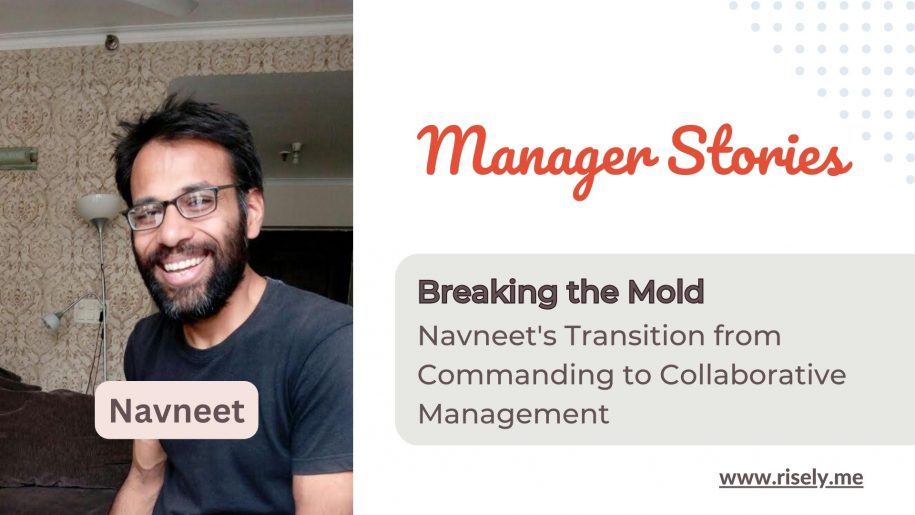Breaking the Mold: Navneet’s Transition from Commanding to Collaborative Management
Navneet views life as a vast canvas, ready to be adorned with vibrant experiences. His zest for living life to the fullest, both personally and professionally, paints each day with a new hue. He is a relentless explorer with an insatiable curiosity about human behavior and psyche; Navneet approaches every human interaction and situation with an eagerness to learn and explore. In his current role as an Engineering Manager at Culturro, Navneet’s career trajectory mirrors his dynamic and adaptable nature. He embarked on his professional journey as a technical engineer, fully immersing himself in programming, coding, and designing. However, the path to his current role was far from linear. Navneet encountered career detours and diverse experiences, each contributing to his growth and development. These experiences have shaped him into the manager he is today. Navneet remains committed to continuous learning and embracing change as he navigates his managerial journey in a rapidly changing work environment.Overcoming Reluctance: The Role of Guiding Leadership
I had initially envisioned myself mostly as an individual contributor. -NavneetBefore joining as a full-time employee, Navneet had already worked with Culturro as a freelancer and had immensely contributed to the technical projects. Initially, Navneet viewed himself as an individual contributor upon joining the team. But he soon realized that Ashish (Co-founder of Culturro) had a different vision for him upon entering the team.
I was a little reluctant to get into a managerial position. -NavneetWhen Navneet was presented with the opportunity to lead the technical team, it marked a significant turning point in his career. Managing a technical team was an entirely uncharted territory for him. Uncertainty clouded his mind, and he questioned his ability to fulfill the responsibilities of a managerial role successfully. Despite his initial reservations, Navneet recognized the alignment between his experience, capabilities, and the company’s needs. He understood his skill set and expertise uniquely positioned him to contribute significantly to the managerial position. Even though he acknowledged the potential benefits, yet he remained unsure about his capacity to execute the role effectively. As a new manager, managing a technical team presented a distinctive set of challenges, introducing uncertainties and variables beyond his previous experience.
My experience with my previous managers was not pleasant. -NavneetNavneet’s reservations were deeply influenced by his past encounters with managers, significantly shaping his reluctance. He had interacted with managers who appeared out of touch with the actual intricacies of tasks, imposing inflexible timelines and methodologies without a genuine understanding of the work’s nuances. Having directly experienced the effects of such strict and inconsiderate managerial styles left a sour impression regarding managerial roles. Navneet’s reluctance to take on the managerial position was a blend of uncertainty about his abilities and reservations rooted in his past experiences. But with his present manager’s guidance and support, Navneet embarked on this managerial journey.
A Limited Perspective: Influence of Surrounding Management Styles
My communication style with the team was not effective. I would give out orders to team members with the exact way the task had to be done. -NavneetNavneet’s initial stint in a managerial role was as a scuba diving center manager, an entirely different domain where he managed a team of dive instructors and masters. He acknowledges that his performance as a manager during that period was poor. Looking back, he recognizes that he followed an autocratic management style and was strict with team members. This approach left little room for meaningful discussions or exploring alternative perspectives. Even when team members attempted to initiate conversations or propose new ideas, Navneet’s receptivity to such input was limited. The repercussions of this approach were evident to Navneet. He saw general discontent spread through the team, leading to an unfavorable work atmosphere.
This was the only style of management I saw followed around me, and I thought it was the only way to do it. -NavneetNavneet’s introspection reveals that his managerial style at the time was heavily influenced by what he had observed from previous managers. His approach was a mirror of the only management style he had encountered. Unconsciously, he perpetuated this pattern, even though he recognized its shortcomings. In retrospect, Navneet identifies the lack of knowledge about alternative management approaches contributing to his adherence to this style. He acknowledges that different circumstances call for different approaches and that adopting a more open, inclusive style could lead to a more productive and enjoyable work environment. This realization is a testament to his growth as a manager, emphasizing the importance of continuous learning and adaptation.
Learning from Experience: A Profound Shift
Navneet reflects on his evolution as a manager and the transformation in his managerial style. His initial experience as a manager left him realizing that he needed to make changes but lacked guidance on how to do so effectively. Upon joining Culturro, his perspective shifted profoundly as Navneet observed a different management style that achieved productivity without compromising team satisfaction. Ashish played a pivotal role during this transformation by providing initial guidance and support. Feedback from team members and colleagues helped him identify areas for improvement.The masterclass gave me the right tools to get into the managerial role. -NavneetThe masterclass designed for managers by Risely truly enlightened him as a manager. This experience gave him valuable insights and a new perspective on the essential elements of effective management. Navneet found that while managing people isn’t rocket science, it requires a different skill set from technical expertise. Soft skills, intuition, and a nuanced understanding of human dynamics take center stage while managing people. The masterclass equipped him with the tools and insights needed to excel in his managerial role, offering a fresh approach aligned with his growth journey.
Slipping into old habits: A Shift from Blame to Understanding
I have consciously tried not to play the blame game and understand the team members’ problem. -NavneetNavneet acknowledges the challenge of slipping back into old management habits, particularly when facing delays or challenges. He recognizes that it’s natural to revert to familiar patterns, such as pushing for tasks to be completed quickly. However, to tackle the situations better, he intentionally avoids using phrases like “get it done” without a context. Instead, he takes a careful approach, seeking to understand the underlying issues causing delays. This might involve addressing unresolved issues or exploring the reasons behind a team member’s decreased efficiency.
Being strict is being unreasonable; being assertive means trying to get everyone on the same page and getting everyone to understand the importance of their task. -NavneetIn such cases, he emphasizes the need to be assertive while maintaining a calm demeanor. To address this challenge, Navneet believes in effective communication. He emphasizes the importance of clearly explaining why a task needs to be completed and the significance of the deadline. By conveying the reasons behind the plan, he encourages team members to align their efforts with the broader objectives.
Identifying and Rectifying Communication Breakdowns
One of the most significant lessons Navneet learned as a manager is the importance of effective communication.Communication is not just limited to delivering your message to the team; it also has other important aspects. NavneetHe believes that communication extends beyond simply conveying messages to the team; it encompasses aspects like managing internal team communication, ensuring every team member has all the information needed, and fostering an environment where team members can freely express their ideas and concerns.
I failed in effectively communicating my expectations from the development team. -NavneetNavneet shared a specific instance where a communication breakdown led to a major setback. While developing a feature for the product, miscommunication with the team resulted in delays and a lack of progress. Recognizing the issue through open communication within the team, Navneet understood the need to enhance his communication methods. To become a more effective communicator, Navneet took proactive steps. He emphasizes the importance of seeking input from his team, avoiding one-sided decisions, and soliciting feedback to ensure team camaraderie. Navneet also believes in addressing team concerns and challenges by actively engaging with team members and understanding their problem areas.
Navneet’s Holistic Approach to Successful Management
Don’t look at people as resources; always see and try to understand where they are coming from. -NavneetNavneet’s words of wisdom for aspiring managers emphasize a human-centric approach. He believes everyone possesses positive and negative aspects, and it’s vital to consider the complete picture instead of categorizing people into predefined boxes of “effective employees” or “ineffective employees.” Navneet stresses that it is the manager’s responsibility to recognize and leverage the employees’ strengths. He suggests that when things aren’t going as planned, it’s not the team’s fault but the manager’s approach that may need adjustment. Managers are pivotal in harnessing their team’s potential and guiding them toward success.
Try to be aware of how you speak with your team members. -NavneetAnother crucial piece of advice is that managers should be mindful of their communication style. Navneet urges budding managers to be mindful of how they communicate with team members and how their words and interactions are perceived. Managers can foster a healthier and more productive work environment by being attuned to their team’s feelings and reactions. In his view, successful management goes beyond technical skills; it involves a deep understanding of human dynamics, empathy, and adaptability. By embracing these principles, aspiring managers can navigate the complex world of leadership with greater effectiveness and impact.
How Risely helps managers achieve their true potential?
Navneet has developed his leadership style and perspective through years of experience. His journey to find the right leadership style to lead his team is commendable. However, it’s essential to recognize that not all managers have the same time, resources, and opportunities to perfect their leadership style. Every manager is unique in their leadership style and challenges. That’s where Risely comes in. Risely offers a platform for managers to seek the guidance and support they need to navigate their leadership journey. It provides tailored steps and insights to help managers refine their approach and achieve their true potential. Here’s how Risely solves challenges for many Co-Founders and Managers like Navneet:- Identify your challenges: The journey begins when a manager starts by defining their challenges. From 30+ challenges, managers and team leaders can identify the issues hurting their team.
- Test your skills: In the second step, skills and qualities are tested, such as expectation setting and prioritization skills, to see how well managers have achieved these critical functions. Based on these assessments, they learn about their skills and abilities with detailed reports.
- Start growing: With time, managers can start making progress with the help of daily nudges provided by Risely. It dynamically supports the manager’s progress through resources like toolkits, samples, and assessments.
Kickstart your leadership development journey for free now!
Learning from mistakes is great. But what if we skip them? Find the loopholes in your skills with Risely’s range of assessments today.
Other Related Blogs
A Decade in Making: Decoding Shyam Gor’s Managerial Approach
A Decade in Making: Decoding Shyam Gor’s Managerial Approach “People don’t leave companies, they leave managers.” We have all heard this adage over the years. Shyam Gor is a manager…
Empowering Teams to Embrace the Vision: Shweta Gandhi’s Story of Leadership
Empowering Teams to Embrace the Vision: Shweta Gandhi’s Story of Leadership Meet Shweta Gandhi, a visionary Co-founder and business strategist taking care of business development, operations, and medical content of…
Inspiring, not managing: Unraveling Pavan Verma’s Journey to the 3 Keys of Leadership
Inspiring, not managing: Unraveling Pavan Verma’s Journey to the 3 Keys of Leadership Pavan Verma, the Co-Founder and CTO of Orgzit, a bootstrapped startup revolutionizing the realm of specialized all-in-one…
Rising above fear: Archana Mahour’s Transformation from Scared Intern to Confident Team Lead
Rising above fear: Archana Mahour’s Transformation from Scared Intern to Confident Team Lead In the bustling world of startups, where founders dream of revolutionizing the world from their ideas and…


